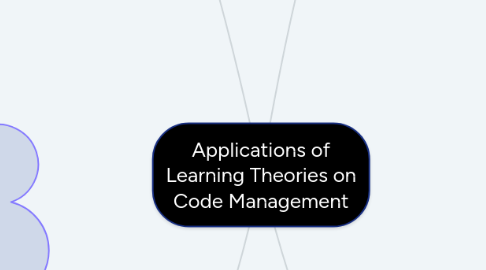
1. Theoreticial framework - Humanism
1.1. Carl Rogers - Experiential Theory
1.2. View of knowledge - education motivates students to develop their potential so that they can progress towards self-actualization
1.2.1. human potential movement
1.2.2. individual's strive to reach full potential
1.2.3. fully functional person
1.2.4. two types of learning identified
1.2.4.1. cognitive - meaningless
1.2.4.2. experiential - significant
1.2.5. addresses the needs and wants of the learner
1.2.6. learning by doing
1.3. View of learning - personal involvement, self-initiated, evaluated by learner, pervasive effects on the learner
1.3.1. subject matter is relevant to personal interests
1.3.2. external threats are minimal
1.3.3. new attitudes or perspectives
1.3.4. several characteristics should be present with learning
1.4. Role of student - assume ownership of learning, teaching, and leadership
1.4.1. become involved in activities
1.4.2. see education as non-linear
1.4.3. lifelong activity they are capable of initiating, building, sustaining, and critically examining
1.4.4. see knowledge as active and engaging
1.4.5. independent and self-directed learning
1.4.6. different and more collaborative relationships between students and adults
1.5. Role of educator - use learning experiences that affective aspects development
1.5.1. promote responsibility
1.5.2. provide for cooperation and mutual respect
1.5.3. provides an atmosphere that is interactive and limitless
1.5.4. students given opportunity to operate outside their comfort zones
1.5.5. traditional learning support specialists to learning coaches
1.5.6. provide for simulation, role play, critical thinking exercises, and reflection
1.5.7. hold students accountable for their own actions and consequences
1.6. How theory informs instruction - creates an interdisciplinary learning experience that mimics real world learning
2. Theoretical framework - Cognitivism
2.1. Max Wertheimer - Gestalt Theory
2.2. View of knowledge - the whole is greater than the sum of its parts
2.2.1. ability to comprehend a concept in its entirety rather than being broken down into segments
2.2.2. breaking down concepts destroys the concepts of behavior
2.2.3. applies to perception and problem solving
2.2.4. considered a part of phenomenology approach to education
2.3. View of learning - the learner comes with perceptions and relates to past experiences which have an impact on learning
2.3.1. learn from real life experiences
2.3.2. gaps, incongruities, or disturbances are important stimulus for learning
2.3.3. four laws of understanding for learning rules
2.3.4. goals and expectations motivate learners to act when imbalances occur
2.4. Role of student - should be able to discover the underlying nature of the problem in the absence of complete information
2.4.1. why are patients decompensating
2.4.2. use critical thinking skills
2.4.3. be proactive
2.4.4. tactic knowledge or gut-feelings
2.5. Role of educator - focus on whole conepts
2.5.1. discussions should focus on whole topics, rather than broken down - ACLS - what to expect in code situations, drugs used, monitoring, devices and use, and so on
2.5.2. teach methods for problem solving
2.5.3. present problems as a whole and attempt to remove mental block from learners so that new information can be stored
2.6. How theory informs instruction - educational instruction should be based on laws of organization - similarity, vicinity, relevance and continuity
2.6.1. have to be able to take into consideration their level(s) of expertise
3. Theoretical framework - Constructivism
3.1. Jerome Bruner - Constructivist Theory
3.2. View of knowledge - theory based on learning and instruction
3.2.1. create meaning out of learned experiences
3.2.2. used to explain how people know what they know
3.2.3. knowledge representation is subject to change
3.3. View of learning
3.3.1. active process where learners are able to form new ideas
3.3.2. based on current knowledge, but uses past knowledge
3.3.3. learning is developmental and that assimilation, accommodation, and construction of knowledge are basic operating processes in learning
3.3.4. form, elaborate, and test mental structures
3.3.5. learning is subjective to the needs, disposition, attitudes, beliefs, and feeling of the learner
3.4. Role of student
3.4.1. Must be able to take old information and apply it to new concepts
3.5. Role of educator
3.5.1. constantly building learner's (student's) knowledge in a spiral manner
3.5.2. focused on encouragement, aiding and allowing students to uncover the main principles on their own
3.6. How theory informs instruction - helps educators to capitalize on knowledge and skills that their students may already possess in order to help them learn new content and skills
4. Theoretical framework - Constructivism
4.1. Jean Lave and Etienne Wenger - Situated Learning
4.1.1. John Seely Brown, Allan Collins, Paul Duguid - Situation Cognition (very similar)
4.2. View of knowledge - theory based on creating meaning from real activities of daily living
4.2.1. occurs int he context of nursing practice environment
4.2.2. bring the real world into the academic setting
4.2.3. prepares students to learn in ill-defined environments - critical care setting (where code situations happen more frequently)
4.2.4. creates a foundation for appropriate clinical decision-making skills, communication, and creativity
4.3. View of learning - learner constructs new knowledge by building on an internal representation of existing knowledge through a personal interpretation of experience
4.3.1. form, elaborate, and test mental structures until they get one that is satisfactory
4.3.2. student is situated into the learning experience
4.3.3. knowledge acquisition is part of the learning activity
4.4. Role of student
4.4.1. learning from others
4.4.2. learner participation and relating is indicative of learning environment and lessons studied
4.4.3. powerful learning tool to form learners into desired shapes and pick-up of desired skills while avoiding others
4.4.4. emulate skills necessary to perform tasks
4.4.5. student must actively participate
4.5. Role of educator
4.5.1. helps the educator understand how people learn
4.5.2. focuses on what people learn in every day situations
4.5.3. engage students in social interaction - driving force behind much of what is being learned in the classroom
4.5.4. coaches for nurses
4.5.5. case studies and simulation - practice which replicates actual setting for events
4.5.6. role play
